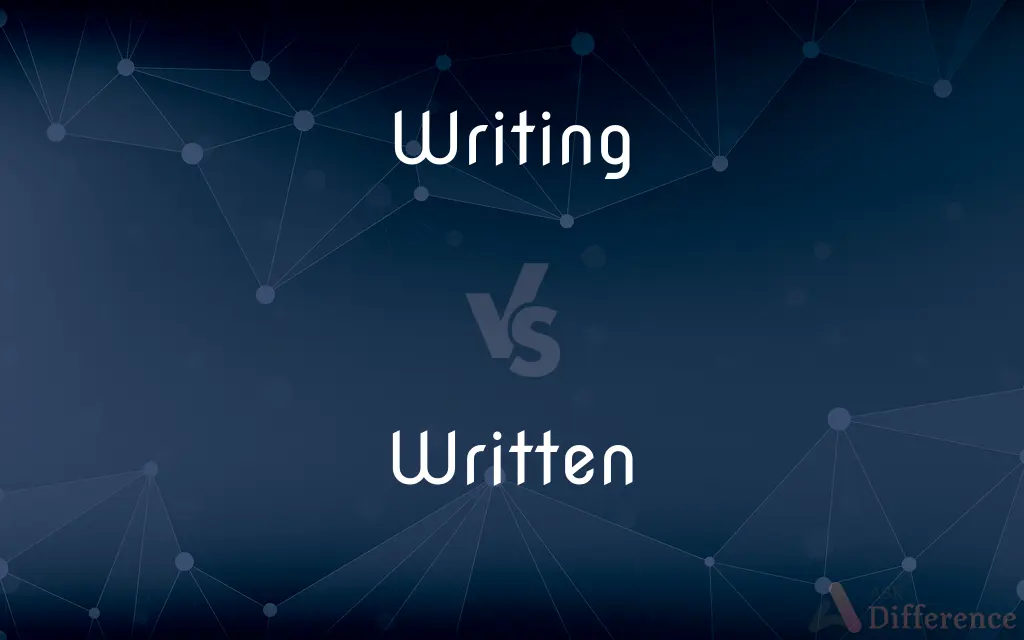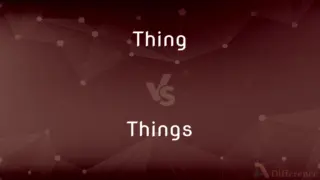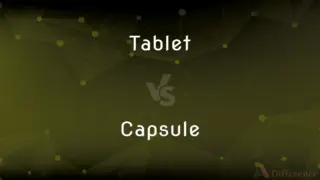Writing vs. Written — What's the Difference?
By Urooj Arif & Fiza Rafique — Updated on April 4, 2024
Writing refers to the act of forming letters or words to express ideas, while written denotes the state of ideas being expressed in text form.

Difference Between Writing and Written
Table of Contents
ADVERTISEMENT
Key Differences
Writing is the process or activity of composing text, involving creativity, structure, and expression. It encompasses everything from jotting down notes, drafting a novel, to composing an email. On the other hand, written is an adjective describing text that has been recorded on a surface or medium, indicating that the process of writing has been completed. For example, a written report is one that has been fully drafted, edited, and finalized.
Writing involves the dynamic process of brainstorming, organizing thoughts, and translating ideas into text. This active engagement with one’s thoughts and language can occur in various forms and for multiple purposes, such as storytelling, communication, or documentation. Written, however, emphasizes the static nature of the text after the writing process is over. It's the finished product that can be read, shared, or published.
The act of writing can be seen as a skill or talent, developing over time with practice and study. It's an art that writers hone, focusing on aspects like grammar, style, and coherence to effectively convey their message. Written work, in contrast, is the tangible or digital outcome of this skill. It represents the culmination of a writer's efforts and can be evaluated, interpreted, or enjoyed by others.
While writing requires an active participant – the writer – the written word exists independently of its creator. Once something is written, it can be engaged with by an audience without the immediate presence or intervention of the writer. This distinction highlights the temporal and participatory differences between the concepts: writing is a verb indicating action, whereas written is an adjective describing the state of the content that has been produced.
In educational and professional contexts, writing is often a task assigned to develop one’s ability to organize and express ideas clearly. The quality of written work is then assessed to evaluate understanding, creativity, or proficiency in language. The transition from writing to written signifies the completion of this task, moving from the creative process to the critique of the final form.
ADVERTISEMENT
Comparison Chart
Definition
The act of composing text.
Text that has been composed and recorded.
Nature
Dynamic and process-oriented.
Static and product-oriented.
Focus
Involves creativity, structure, and expression.
Emphasizes the finalized state of text.
Skill Development
Can be developed with practice and study.
Represents the culmination of writing skills.
Dependency
Requires an active writer.
Exists independently of the writer.
Compare with Definitions
Writing
Varied forms.
Writing can range from poetry to technical manuals.
Written
Static product.
Once written, the poem was published in the magazine.
Writing
Personal expression.
Journal writing is a form of personal reflection and expression.
Written
Digital or tangible.
Written records can be stored digitally or on paper.
Writing
Creative process.
Writing a novel involves character development and plot structuring.
Written
Evaluation.
The teacher graded the students' written essays.
Writing
Active engagement.
Writing an essay requires active thought organization.
Written
Independent existence.
The written law governs with or without its authors.
Writing
Skill development.
Regular writing practice can improve one’s grammar and style.
Written
Completed text.
The written instructions were clear and concise.
Writing
Writing is a medium of human communication that involves the representation of a language with written symbols. Writing systems are not themselves human languages (with the debatable exception of computer languages); they are means of rendering a language into a form that can be reconstructed by other humans separated by time and/or space.
Written
Past participle of write.
Writing
The activity or skill of writing
Parents want schools to concentrate on reading, writing, and arithmetic
Written
Of, relating, or characteristic of writing (i.e., of that which has been written).
Writing
The activity or occupation of composing text for publication
She made a decent living from writing
Written
Having been written.
I can speak Japanese fairly well, but I have no understanding whatsoever of written Japanese.
Writing
The act or process of producing and recording words in a form that can be read and understood
At first, most students find writing difficult.
Written
Inflection of write
Has your girlfriend written you a letter yet?
Writing
The occupation or style of someone who writes, especially for publication.
Written
Set down in writing in any of various ways;
Written evidence
Writing
Written form
Put it in writing.
Written
Systematically collected and written down;
Written laws
Writing
Handwriting; penmanship
Writing that has many flourishes.
Written
Written as for a film or play or broadcast
Writing
Meaningful letters or characters that constitute readable matter
Erased the writing on the blackboard.
Writing
A written work, especially a literary composition
Collected all the author's writings.
Writing
Writings (used with a sing. or pl. verb) Bible The third of the three divisions of the Hebrew Scriptures, composed of Psalms, Proverbs, Job, Song of Solomon, Ruth, Lamentations, Ecclesiastes, Esther, Daniel, Ezra, Nehemiah, and Chronicles. See Table at Bible.
Writing
(uncountable) Graphism of symbols such as letters that express some meaning.
Writing
(countable) Something written, such as a document, article or book.
Writing
(uncountable) The process of representing a language with symbols or letters.
Writing
(countable) A work of an author.
Writing
(countable) The style of writing of a person.
I can't read your writing.
Writing
Intended for or used in writing.
A writing table
Writing
Inflection of write
Writing
The act or art of forming letters and characters on paper, wood, stone, or other material, for the purpose of recording the ideas which characters and words express, or of communicating them to others by visible signs.
Writing
Anything written or printed; anything expressed in characters or letters
And Pilate wrote a title . . . And the writing was, Jesus of Nazareth, the King of the Jews.
Writing
Handwriting; chirography.
Writing
The act of creating written works;
Writing was a form of therapy for him
It was a matter of disputed authorship
Writing
The work of a writer; anything expressed in letters of the alphabet (especially when considered from the point of view of style and effect);
The writing in her novels is excellent
That editorial was a fine piece of writing
Writing
(usually plural) the collected work of an author;
The idea occurs with increasing frequency in Hemingway's writings
Writing
Letters or symbols written or imprinted on a surface to represent the sounds or words of a language;
He turned the paper over so the writing wouldn't show
The doctor's writing was illegible
Writing
The activity of putting something in written form;
She did the thinking while he did the writing
Common Curiosities
Can something be writing and written at the same time?
While writing is the process, once completed, the product is described as written; they represent sequential stages.
Is digital content considered written?
Yes, digital content, once composed and saved, is considered written.
How does writing develop into written work?
Through the process of drafting, revising, and finalizing, writing becomes a written work.
Can written work be changed?
Yes, written work can be edited or revised until it's published or considered final.
Can the quality of writing be improved after it's written?
Yes, through editing and revision, the quality of written material can be enhanced.
What role does technology play in writing and written works?
Technology offers tools for writing (word processors, digital pens) and platforms for sharing written works (blogs, eBooks).
What is the difference between writing and written?
Writing refers to the act of composing text, while written describes text that has been composed and recorded.
Is coding considered writing?
Yes, coding is a form of writing where the "text" is computer code, which then becomes a written program.
How do we evaluate writing skills?
Through the analysis of written works, assessing aspects like clarity, coherence, grammar, and creativity.
How does writing affect communication?
Writing enhances communication by allowing precise expression of ideas and facilitating their dissemination as written content.
What tools are essential for writing?
Tools can range from pen and paper to digital devices and software designed for writers.
How does the audience interact with writing versus written works?
The audience engages with the process of writing through collaboration or feedback, while written works are consumed or analyzed independently.
What is the importance of transitioning from writing to written?
It signifies the completion of the creative process, making ideas accessible and permanent as written material.
How does writing contribute to learning?
It facilitates critical thinking, creativity, and knowledge consolidation.
Why is the distinction between writing and written important?
Understanding this distinction helps appreciate the process of creation and the value of the final product in communication and expression.
Share Your Discovery

Previous Comparison
Thing vs. Things
Next Comparison
Tablet vs. CapsuleAuthor Spotlight
Written by
Urooj ArifUrooj is a skilled content writer at Ask Difference, known for her exceptional ability to simplify complex topics into engaging and informative content. With a passion for research and a flair for clear, concise writing, she consistently delivers articles that resonate with our diverse audience.
Co-written by
Fiza RafiqueFiza Rafique is a skilled content writer at AskDifference.com, where she meticulously refines and enhances written pieces. Drawing from her vast editorial expertise, Fiza ensures clarity, accuracy, and precision in every article. Passionate about language, she continually seeks to elevate the quality of content for readers worldwide.
















































